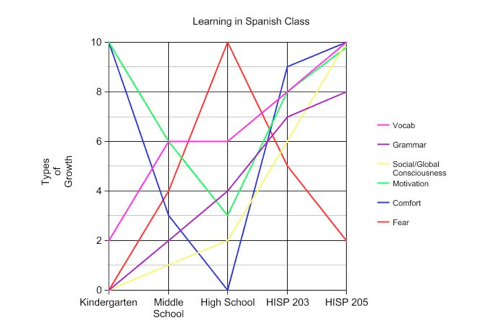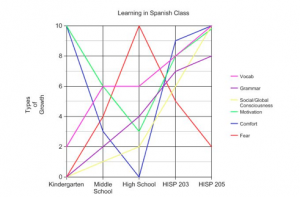- Taking the 20,000 foot view on my class
- Ending the semester, Lessons Learned (Part 4: Assessment)
- The Backwards Syllabus
- Low hanging fruit
- VoiceThread as Final Exam
- Teaching outside of the textbook and inside of the museum
- Digital Storytelling and Language Learning
- Blogging their scholarship
- Professional development: Simple, small-scale, and cost-effective
- Why I teach.
- Teaching Transparently: Scuba diving in 2nd year college Spanish
- Ending the semester, lessons learned (Part 3)
- Social Networking and Octegenarians
- Ending the semester, lessons learned (Part 2)
- Ending the semester, lessons learned (Part 1) … (of what will be many)
- Midterm assessment: My turn
- What’s under the hood: letting the outside in
- Informal Assessment, Disruption & Repair: Making change happen.
- Week 4: What? You don’t want me to write a paper?
- Welcome to the free fall
- Struggling with the Syllabus
- Imagining a college without grades
- Reflections from the Chair Swing, Moving into the Summer
- Syllabus Hacking with Bryan and the bava
- Well this is embarrassing
- There is no mystery in grading
- Using Can-Do statements for student self assessment
- El Proyecto Personal: Creating Conversations, Taking Risks, Learning to Prepare for the World Outside the Classroom
- Creating Radio in the Language Classroom
- Teaching Acceptance through Storytelling
- Improvisational teaching
- Fear, Motivation, Social Consciousness and Language Learning: the graph
- Using Radio Ambulante in the Spanish language classroom
- Creating, Uploading, Commenting and Sharing Audio via SoundCloud
- Notes I jotted to myself at the end of the term
- Student-centered, project-based learning…and a medical emergency
- Taking a tour of the HISP 205 class blog
- Let’s go bowling!
- Cooking with Drag Queens: Teaching Inclusion and Discovering the Limits of the Spanish Language
- Tune Up and a Smack down (part 2): The gringa returns to Bogotá
- A tune-up and a smack-down: The gringa returns to Bogotá
- Rethinking the role of the language textbook
- Our WordPress Class Blogging Tool: Now Yours Too
- A few shout outs and a woof
- Mid semester evaluation: Do it.
- What we did in class today, and no I can’t get you the notes.
- Searching for blogs in all the wrong places.
- Planning for HISP205-09… in Second Life
As I started to put away papers from the last semester, I found this graph that one of my students created as part of his final self assessment in our class (HISP 205).
Even though the student admits this graph was somewhat tongue-in-cheek, I think there are some serious truths here.
I appreciate the inclusion of FEAR into the conversation about learning a second language….and the inverse relationship that exists between FEAR and MOTIVATION during high school years. I know from personal experience how anxiety and pressure and high stakes test taking in high school can adversely affect a student’s ability to demonstrate knowledge…some people freeze during tests. The graph suggests that here, but also another outcome: the more pressure and fear also results in a lack of motivation, in a “not giving a flying carajo” about the subject matter anymore. The higher the stakes and the greater the pressure… the less the student wants to learn.
Interesting.
The slow and steady climb of the SOCIAL/GLOBAL CONSCIOUSNESS line is what helped the student consider taking languages again after high school. In this student’s case, there was a junior year program that he was interested in and it required completion of the 2nd year of Spanish, so that was what prompted his re-entry into the language classroom. Hooray. It’s moments such as these that I feel like I am an emergency room doctor, relieved to know that her patient is going to live…”We almost lost him, but he is going to make it…”
Over the past 4 years or so, I have noticed that my job as a college-level language teacher is to remediate some of the damage that high stakes testing has done to language learning in middle and high school learning. Students come to my language classes as smart, creative, talented people, but bruised by years of teachers teaching to the test. Often they are more aware of what they don’t know and can’t do instead what they do know and what they can do and do well. Many are convinced they will never achieve fluency or ever speak the language because they will never master certain grammatical forms. But the reality is usually the opposite: these are intelligent, capable young people who have been burdened by both taking exams and being measured by metrics, metrics that are quick to show what a student can’t do, vs demonstrating what a student knows and can do.
Over that same amount of time, just like with this student, I have seen an increase in the number of students who want to take my class because of what they want to DO with the language, vs just studying it for the sake of knowing the language better as they did in high school. And just like this graph shows, when they are able to make a connection between the study of the language and a personal goal, the motivation increases, the fear diminishes, and that social/global consciousness takes off.
As I begin to get ready for the fall semester, and for the new students that are coming to my college to continue their language study, I also think about this article from retired high school teacher Ken Bernstein that made the rounds earlier this year. It is a sobering look at how high stakes testing has failed students, teachers, and the educational system as a whole. No one person, group, test, school is to blame … and yet we all need to be a part of the solution.
I think I will show this graph to new students, and ask them to plot themselves somewhere on the grid. My hope is that they will see that it can get better, and remind them that if they have not yet mastered the subjunctive in Spanish, that’s okay, and they are by no means a miserable failure because of that.
“Con ganas, sí se puede“


[…] I appreciate the inclusion of FEAR into the conversation about learning a second language….and the inverse relationship that exists between FEAR and MOTIVATION during high school years. I know from personal … […]